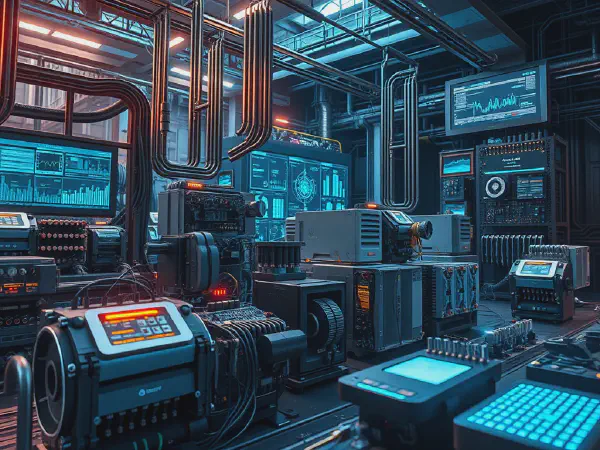Exploring Industrial Electronic Equipment: Trends and Insights

A Comprehensive Guide to Industrial Electronic Equipment
Industrial Electronic Equipment is a crucial component of modern manufacturing and automation processes. This equipment encompasses a wide range of devices and systems designed to monitor, control, and enhance industrial operations, contributing to increased efficiency and productivity in various sectors.
The significance of Industrial Electronic Equipment cannot be overstated, as it plays a vital role in simplifying complex processes, ensuring accurate control and monitoring of production lines, and facilitating real-time data acquisition and analysis. From automation controllers to sensors, this equipment assists in optimizing production capabilities.
Investing in a reliable 3-phase power meter data logger significantly improves energy efficiency in industrial settings.
With the advancement of technology, Industrial Electronic Equipment has evolved to include more sophisticated devices that integrate seamlessly with modern communication protocols, enabling better cooperation between machines and operators. This evolution has significantly influenced how industries approach automation and process management, making these tools indispensable in today's competitive landscape.
Moreover, the use of Industrial Electronic Equipment allows businesses to adopt innovative strategies such as predictive maintenance and energy management, which further enhance operational efficiency. As industries continue to embrace digital transformation, understanding the role and capabilities of Industrial Electronic Equipment is essential for navigating the future of industrial operations.
In summary, Industrial Electronic Equipment serves as the backbone of many industrial sectors, providing the necessary support for automation, monitoring, and control processes that drive productivity and innovation.
Types of Industrial Electronic Equipment
Automation controllers are one of the most critical components of Industrial Electronic Equipment. These devices are responsible for managing and coordinating the actions of machines and processes in an automated system. They receive inputs from various sensors, process this information, and generate commands to actuate machinery, optimizing operations in real time.
Businesses can enhance productivity with a compact fanless mini pc that operates quietly and efficiently under challenging conditions.
Sensors and detectors play a pivotal role in Industrial Electronic Equipment by providing essential data about the physical environment. These devices can measure various parameters such as temperature, pressure, motion, and light, ensuring that automation systems respond accurately to changes in conditions, thereby maintaining safety and efficiency.
The rfi-150 integrates seamlessly with various systems, offering robust performance for demanding electronic applications.
Power supplies are integral to Industrial Electronic Equipment, as they provide the necessary electrical energy for all devices to operate. They come in various forms, including uninterruptible power supplies (UPS), transformers, and converters, ensuring a stable voltage and current supply while protecting machinery from electrical fluctuations.
Industrial computers are designed to withstand harsh environments and operate continuously in demanding conditions. They serve as central processing units in automation setups, facilitating data processing, storage, and communication between various components of the industrial system.
Actuators are essential devices in Industrial Electronic Equipment that convert electrical signals into mechanical motion. They control the movement of machinery and equipment, enabling precise actions such as opening valves, moving conveyor belts, or adjusting the position of components in manufacturing processes.
Applications of Industrial Electronic Equipment
Manufacturing automation is one of the primary applications of Industrial Electronic Equipment. By employing various advanced technologies, businesses can automate repetitive tasks, improve production rates, reduce labor costs, and achieve higher consistency in product quality.
Process control is another vital application of Industrial Electronic Equipment. It involves using sensors and controllers to monitor and control various industrial processes, ensuring they remain within set parameters for optimal safety and performance. This application is crucial in industries such as oil and gas, pharmaceuticals, and food processing.
Energy management systems utilize Industrial Electronic Equipment to monitor energy usage across various industrial applications. By analyzing the data collected from power supplies and systems, businesses can make informed decisions to optimize energy consumption, reduce costs, and minimize their environmental impact.
Transportation systems benefit significantly from Industrial Electronic Equipment, which enhances the monitoring and control of logistics operations. This application includes automated vehicles, traffic management systems, and rail controls that improve the efficiency and safety of transportation networks.
Telecommunications systems rely on Industrial Electronic Equipment for network management, data routing, and signal processing. Increased automation and control capabilities enable service providers to deliver higher-quality services and better manage their resources.
Benefits of Industrial Electronic Equipment
One of the primary benefits of Industrial Electronic Equipment is increased productivity. By automating tasks and processes, businesses can produce more products in less time, ultimately leading to higher profits and market competitiveness.
Enhanced precision is another significant advantage of Industrial Electronic Equipment. With the use of sensors and actuators, industries can achieve higher levels of accuracy in their processes, reducing errors and waste, which is crucial for maintaining quality standards.
Cost efficiency is realized through the implementation of Industrial Electronic Equipment, as automation reduces labor costs and minimizes operational downtime. Businesses can allocate resources more effectively, leading to a more profitable operation overall.
Real-time monitoring capabilities afforded by Industrial Electronic Equipment enable businesses to gain immediate insights into their operations. This monitoring allows for quick response to issues, thereby minimizing disruptions and enhancing overall system performance.
Safety improvements are a vital benefit, as Industrial Electronic Equipment can monitor hazardous conditions and automatically shut down processes or alert personnel when necessary, reducing the risk of accidents and protecting both workers and equipment.
Challenges in Industrial Electronic Equipment
Wear and tear is a common challenge faced by Industrial Electronic Equipment. Continuous operation and exposure to harsh environments can lead to equipment degradation, necessitating regular maintenance and replacement to ensure optimal function.
Obsolescence of technology poses another challenge, as equipment may become outdated rapidly due to technological advancements. Companies must continuously assess their systems and invest in updates to remain competitive in their respective industries.
Integration with legacy systems can be complicated, as outdated equipment may not seamlessly work with modern Industrial Electronic Equipment. Transitioning to new systems requires careful planning and implementation to avoid disruptions in operations.
Skill shortages in the workforce can hinder the effective use of Industrial Electronic Equipment. As technologies evolve, finding personnel with the necessary skills to operate and maintain advanced systems becomes increasingly challenging.
Cybersecurity threats are a growing concern as industries invest in connected devices. Safeguarding industrial systems against cyber-attacks requires continuous monitoring, updates, and employee training to mitigate potential risks associated with increased digitalization.
Future Trends in Industrial Electronic Equipment
The Internet of Things (IoT) advancements are significantly shaping the future of Industrial Electronic Equipment. As devices become increasingly interconnected, organizations can collect and analyze vast amounts of data, leading to enhanced decision-making and improved operational efficiencies.
AI integration is expected to revolutionize Industrial Electronic Equipment by enabling advanced analytics, predictive maintenance, and smarter automation processes. This trend will allow for unprecedented insights into operations and better utilization of resources.
Sustainability practices are becoming a priority, with industries recognizing the need for environmentally friendly operations. Industrial Electronic Equipment will play a critical role in optimizing processes to reduce waste and energy consumption while promoting eco-friendly practices.
Smart manufacturing trends are influencing the development of Industrial Electronic Equipment, focusing on creating flexible, efficient production systems that can adapt to changing market demands. This approach emphasizes modular, scalable solutions that can readily integrate emerging technologies.
Remote monitoring capabilities will become increasingly important in Industrial Electronic Equipment, allowing operators to oversee and control operations from distant locations. This trend supports the growing need for flexibility and responsiveness in today's fast-paced industrial environments.
